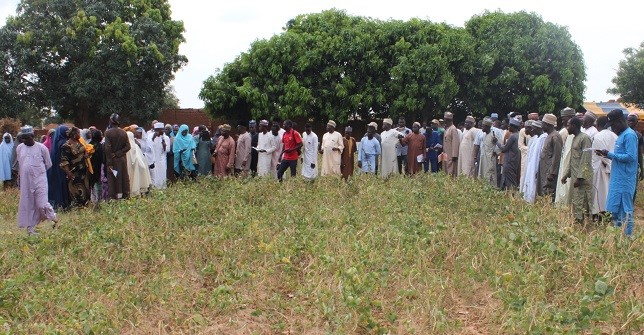A new beans variety developed by the Institute for Agricultural Research (IAR), Ahmadu Bello University in Zaria, in partnership with the African Agricultural Technology Foundation (AATF), is said to have performed better than existing beans varieties in the country.

The new variety, known as Pod Borer Resistant (PBR) Cowpea, was developed after 10 years of research work at the IAR. This was followed by a nation-wide demonstration trial.
As one requirement for the nation-wide release to farmers, the IAR was required to undertake a national performance trial to collate data for submission to the National Committee on Naming, Registration and Release of Crop Varieties after the crop was approved by the Nigerian government in January 2019 as safe to be planted in the country.
The PBR Cowpea is genetically modified against the deadly Maruca vitrata pest, which scientists claimed has been a challenge facing beans farmers over the years.
Speaking at the PBR Cowpea Farmers’ Field Day held in Bagadawa, Kano State on Monday, October 7, 2019, Prof. Ishiyaku Mohammad, lead scientist for the PBR Cowpea research team, noted that the journey that culminated in the field trials started in 2009 when IAR filed an application for permission to commence research into the genetically engineered beans plant resistant to a notorious Pod Boring insect, Maruca, in the field under confinement.
Prof. Ishiyaku, who was represented by Dr. Mohammed Lawan, the National Trial Manager, said: “The performance we’re witnessing today is consistent with what we have been having for the last six years of trials. We are happy to provide farmers with a cowpea variety that is easy to manage, and with the potential of 40 percent higher yield over its counterparts.
“After series of both on-farm and confined field trials which our research team conducted, we were able to prove not only that the new crop is truly resistant to the insect pest (Maruca) but also has the same physical and chemical profile as the ordinary cowpea. The results of over 10 years of experiments showed that the crop does not cause any harm or negative effect on the environment or to us.
“In addition to the naturally occurring Maruca insect in the field, additional larva of the insect was reared and released onto the tests plants in order to verify the earlier resistance in the laboratory. This experiment was repeated for four successive years and revealed consistently between 100 to 200% yield advantage in the resistant plants compared to the ordinary cowpea plants.”
According to the AATF PBR Cowpea Manager, Dr. Issoufou Kollo Abdourhamane, the development being witnessed is part of the determination of the AATF to keep its promises to farmers in Africa.
Dr. Kollo, who was represented by Mr. Oluseun Bolarinwa, the AATF Programme Officer – Seeds, expressed delight in hosting the farmers and other stakeholders at the Farmers’ Field Day so they could experience the benefits of cultivating the PBR Cowpea.
He stated: “We are very hopeful that the success of these demonstration trials across the country will lead to the registration and release of the PBR Cowpea for cultivation by farmers across the country.
“Farmers who have participated in the demonstration trials have conveyed their excitement about the benefits of the PBR cowpea such as a reduction in the use of insecticides, better grain yields and better grain quality.”
He also commended the farmers who participated in the on-farm trials, the research scientists who executed the on-station trials, and the local and international partners that provided technical and financial support for the development and commercialisation of the PBR Cowpea in Nigeria.
Some of the farmers who spoke applauded the performance of the PBR Cowpea when compared with their preferred varieties.
“I have been planting beans for the last 16 years but have never seen any variety like the PBR Cowpea, it is early maturing, produces more pods, needs only two rounds of insecticide sprays and is very easy to manage,” says Suleiman Aliyu, a farmer based in Minjibir Local Government in Kano State.
Another farmer, Sale Abdul Bichi, an ADP official at the Bichi Agro Centre, also commended the PBR Cowpea which he says does not require 10 “sessions” of insecticide sprays and is early maturing and with impressive yield. The demonstration trials were conducted in about 24 locations in 12 states of the federation on farmers plots and research institutes’ farm sites.
